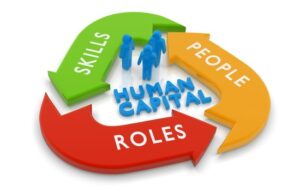 Employees are the largest chunk of a company’s expenses: therefore, it behooves us to make sure we are investing wisely. The most important resource in any economy or organization is its human capital—that is, the collective knowledge, attributes, skills, experience, and health of the workforce. While human capital development starts in early childhood and continues through formal education, it spans the full working life.
Employees are the largest chunk of a company’s expenses: therefore, it behooves us to make sure we are investing wisely. The most important resource in any economy or organization is its human capital—that is, the collective knowledge, attributes, skills, experience, and health of the workforce. While human capital development starts in early childhood and continues through formal education, it spans the full working life.
Human capital isn’t like other assets. that can be sold for a profit.
It may be a fine line, but people don’t sell their skills and talents; they enter into a contract with an employer and get paid to provide their expertise.
Cultural capital includes professional development and emotional intelligence. While social capital focuses on relationships and can be displayed in team building, shared beliefs and values, as wll as collaboration. Companies with strong social capital have higher employee retention and a culture of trust. Intellectual capital is the value of the knowledge, skills, and innovative and creative ideas of the people within an organization.
Human capital has a huge impact on the economic growth of businesses and includes the following which drive growth
Education
Health
Mental and emotional well-being
Creativity
Personal resilience
Communication skills
Why invest in Human Capital? Just like any other capital resource, human capital is mobile. People can move to any company that values their skills and capabilities. It impacts retention.
There are many ways to invest in Human Capital. Employee development is key but it’s more than just training it includes corporate learning;
Another important way to invest in employee development is to invest in personal growth and well-being, both of which are intricately connected to professional performance . Ongoing coaching, wellness benefits, and career opportunities provide real value to employees and also helps them perform better and more sustainably, creating value for the company.
In addition Investing in human capital also means helping employees balance family responsibilities. A healthy work-life balance decreases stress and increases loyalty productivity and performance.
Business departments or leaders aren’t the only ones who should be investing in human capital.Each individual is responsible for growing their own skill set, education, and abilities. Having a high human capital makes you more competitive and leads to higher compensation opportunities.
What are you and your company doing to improve the human capital in your workplace? Need ideas? Contact me and let’s brainstorm
Recent Comments